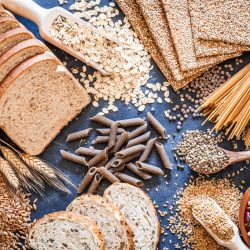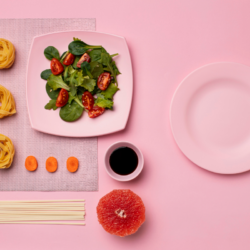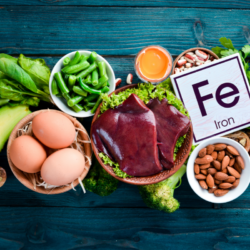Ramadan, a period of fasting from sunrise to sunset, brings unique challenges for the body and health. During this month, eating habits change considerably, which can influence our weight and general well-being. Indeed, the often rich and festive meals at the end of the fast and the reduction in physical activity can contribute to weight gain. (1)
Ramadan is a sacred month for Muslims, involving daily fasting from dawn until sunset. While this can be a beneficial spiritual practice, it is important to ensure that your diet remains balanced and healthy during this period. In this natural health blog post, we’ll explore how to naturally manage your diet during Ramadan 2025. We’ll give you practical advice on what to eat, when to eat, how to stay hydrated and how to avoid cravings. By following these tips, you can ensure that your fast is not only good for your spirituality, but also for your overall health.
What are the five pillars of Islam?
The five pillars of Islam represent the foundations of a Muslim’s life, setting out the basic principles and practices that every believer is called upon to follow. Here is a concise explanation of each of the pillars:
- The Shahada (Profession of Faith): This is the first and most fundamental pillar of Islam. It consists of the declaration of faith “There is no god but God, and Muhammad is the messenger of God”. This sentence affirms the oneness of God and the prophethood of Muhammad.
- Salat (Prayer): The ritual prayer, performed five times a day, is an act of devotion to God that punctuates the believer’s day. Prayers are prescribed at dawn, mid-day, mid-afternoon, sunset and in the evening.
- Zakat (Almsgiving): This pillar involves a charitable obligation, whereby a fixed percentage of each Muslim’s annual savings must be given to the poor and needy in order to purify his or her wealth.
- Sawm (Ramadan fasting): During the holy month of Ramadan, Muslims fast from sunrise to sunset, abstaining from food, drink, smoking and marital relations. Fasting is a method of spiritual purification and of strengthening compassion towards those less fortunate.
- Hajj (Pilgrimage to Mecca): Every Muslim who is physically and financially able must undertake the pilgrimage to Mecca at least once in his or her life. The Hajj takes place during the last month of the Islamic calendar and represents the fulfilment of a spiritual quest.
Each pillar plays a crucial role in consolidating faith and unity within the Muslim community, while providing a framework for personal spiritual development. These practices are essential for leading a life in accordance with the teachings of Islam and for strengthening one’s relationship with God.
When does Ramadan 2025 begin?
Ramadan is the ninth month of the Islamic lunar calendar, which means that its start date varies each year according to the sighting of the moon. The start of Ramadan is marked by the appearance of the new moon, generally visible to the naked eye a day or two before the end of the month of Sha’ban.
The end of Ramadan in 2025, similar to the start of the holy month, will depend on the sighting of the crescent moon on the “night of doubt”. This is when the end date will be determined and officially announced, probably by the Grand Mosque of Paris. According to forecasts, this date could be 29 March 2025.
The first few days of Ramadan involve the body in a process of gluconeogenesis, using the amino acids in muscle proteins to produce glucose. Around the 5th day, the metabolism adapts, with fatty acids and ketone bodies becoming the main sources of energy, reducing dependence on proteins.
How should you divide your diet during Ramadan?
During Ramadan, it’s important to eat a balanced diet to ensure you stay healthy and keep up your energy levels throughout the day. To do this, it’s advisable to spread your diet over three regular meals at stable times, rather than snacking throughout the night. In fact, if it’s managed properly, Ramadan fasting can bring health benefits. However, the first few days can induce lethargy due to the drop in blood sugar. Maintaining a balanced diet and good hydration is crucial to counteract these effects. An unbalanced diet can lead to weight gain, deficiencies and other inconveniences such as bad breath and headaches.
Here’s how you can divide up your diet during Ramadan:
The meal before sunrise (S’hour)
S’hour is the meal you eat before sunrise. It’s important to eat a nutritious, balanced meal to help you get through the day. You can eat foods rich in protein and fibre, such as eggs, wholegrain cereals and fruit. Avoid foods high in fat and sugar, as they can make you feel tired throughout the day.
Breakfast at the end of the fast (Iftar)
Iftar is the meal you eat to break the fast. It’s important not to overeat at Iftar, as this can cause digestive problems and a feeling of heaviness. You can eat nutrient-rich foods such as vegetables, fruit, wholegrain cereals and lean proteins. Avoid fatty and fried foods, as these can cause digestive problems and an upset stomach.
Dinner (during the night)
Dinner is the last meal you eat before sunrise. It’s important to eat a light, nutritious meal to get you through the night. You can eat foods rich in fibre and protein, such as vegetables, grilled chicken or fish. Avoid fatty and fried foods, as they can cause problems with digestion and sleep.
How can I stay well hydrated during Ramadan?
During Ramadan, make sure your body stays well hydrated despite fasting. Lack of water can lead to dehydration and health complications. To stay hydrated during Ramadan, it’s advisable to drink enough during the permitted periods. Ideally, you should drink at least 8 to 10 glasses of water a day. You can also drink hydrating beverages such as milk, natural juices or sports drinks.
It’s also important to avoid drinks that can dehydrate you, such as those containing caffeine. These drinks can cause you to lose water and increase your sensation of thirst.
Finally, you can also get water from your food. Fresh fruit and vegetables are an excellent source of hydration, as they contain a lot of water. Try adding water-rich fruit and vegetables such as cucumber or watermelon to your diet.
By following these tips, you can ensure that your body stays well hydrated during Ramadan. What’s more, it will allow you to fast safely and comfortably.
How do you balance your meals during Ramadan?
Meals should be balanced, with one food from each of the main food groups (starchy foods, fruit and vegetables, fish or eggs, dairy products). Don’t neglect complex carbohydrates such as semolina or barley. They are all too often replaced by simple carbohydrates (cakes, pastries, soft drinks). It’s better to prepare dishes that allow you to eat a little more vegetables.
The following foods should be eaten in moderation: oriental pastries (msemen, sfenj), oleaginous fruits (peanuts, pistachios, almonds) and pastries.
Dietary advice to follow during Ramadan to avoid putting on weight:
| Dietary advice | Details and recommendations |
|---|---|
| Hydration | Drink enough water between Iftar and Suhour. Avoid sugary and caffeinated drinks. |
| Distribution of meals | Eat 3 meals: Iftar, a light evening meal and Suhour. Avoid night-time snacking. |
| Choice of food | Favour foods rich in fibre (fruit, vegetables) and lean proteins. |
| Preparing dishes | Cook with less fat. Prefer healthy cooking methods (grilling, steaming). |
| Portion control | Avoid large portions, especially during Iftar. Eat slowly and listen to your hunger. |
| Reduce foods high in sugar and fat | Limit pastries, fried foods and very sweet dishes. |
| Physical activity | Maintain a moderate level of physical activity, especially after Iftar. |
This table offers a balanced approach to healthy eating during Ramadan, taking into account hydration, meal distribution, food choices, dish preparation, portion control, reducing foods high in sugar and fat, and the importance of physical activity. This advice can help you maintain a stable weight while respecting fasting practices.
The importance of vitamin supplements during Ramadan
Ramadan means significant changes to eating habits and mealtimes. In this context, the intake of vitamins and essential nutrients can sometimes be insufficient, which is why it is important to consider the use of food supplements.
- Compensating for nutritional deficiencies: During fasting, opportunities to consume foods rich in vitamins and minerals are limited. Food supplements can help to make up for any deficiencies, particularly in vitamins D and B12, iron and calcium, which are often less present in fast-breaking meals.
- Supporting metabolism and energy: B vitamins, in particular, play a crucial role in energy metabolism. A sufficient intake of B vitamins can help maintain energy levels and reduce the feeling of tiredness often associated with fasting.
- Boosting the immune system: Fasting, especially when prolonged, can affect the immune system. Vitamins such as vitamin C and vitamin D are known for their role in supporting the immune system, which is particularly relevant during Ramadan in preventing illness.
- Improved bone and muscle health: With limited hours for eating and sometimes reduced sun exposure, vitamin D levels can fall, affecting bone health. Vitamin D and calcium supplements are therefore essential for maintaining strong bones and muscles.
- Advice on taking supplements: It is advisable to take food supplements during the Iftar or Suhur meal to optimise their absorption and reduce the risk of stomach upsets. However, it is crucial to consult a health professional before starting any supplementation regime, especially for individuals with specific medical conditions.
What precautions should I take during Ramadan?
Although fasting during Ramadan is generally risk-free for healthy individuals, certain populations such as people with chronic illnesses, diabetics, pregnant or breastfeeding women, and the elderly should exercise caution and consult a health professional if necessary.
We advise you to consult a doctor before taking the product in order to assess the situation:
- Controlling your diabetes
- Precautions to take in the event of hyperglycaemia or hypoglycaemia
- Adjustment of medication (in agreement with the doctor)
- Self-monitoring of blood sugar levels, by testing blood sugar levels more frequently, as during Ramadan diabetes can become very unbalanced. It is advisable to have at least one capillary blood glucose test before each meal and two during the fast.
- Limit physical and sporting activities during the fasting period, especially in hot weather. Stop fasting if blood sugar levels fall below 0.70 mg/dL, and immediately start drinking again. If you need help (tiredness, feeling unwell, etc.) or have any problems, consult your doctor.
References:
https://www.emro.who.int/fr/noncommunicable-diseases/campaigns/stay-healthy-during-ramadan.html





